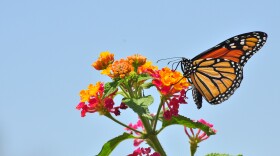Monarch butterflies need more to eat. That's the conclusion of a new study from the U.S. Geological Survey.
The only thing monarch butterfly caterpillars can eat is milkweed.
Wayne Thogmartin is a quantitative ecologist with the USGS. He says the butterfly population has dropped by about 80% since the mid-90s. The population has rebounded a little bit in the last three years, but Thogmartin says it's not a huge improvement.
“I wouldn’t say they’re recovering at all, they’re just bouncing around at a lower level," he says.
Thogmartin says monarchs used to rely on milkweed in corn and soybean fields in the upper Midwest, until the herbicide glyphosate was widely used.
“And with the application of glyphosate to genetically modified corn and soy fields, which now occur over 90% of all corn and soy, the application of glyphosate to those fields has basically removed all milkweed," he says.
He says monarchs are now relying on milkweed in other places, outside of farm fields. But he says there’s just not enough of it. He estimates monarchs need 1.8 billion more stems of milkweed. So, he says we should plant more of it.
“So, people’s backyards, rights of way such as roadsides, or rail line or power line rights of way. We might seek additional conservation reserve program lands, for instance,” he says.
If you do plant milkweed in your backyard, he says you should go for native varieties and avoid any milkweed that’s treated with neonicitinoid pesticides because they can kill monarch caterpillars.







